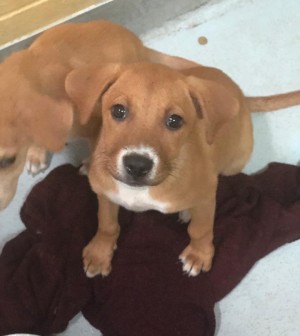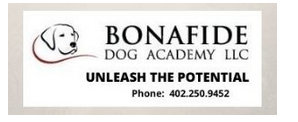- Do you subscribe to Dharma Dog Training’s Newsletter? You should.
- A Unique Campaign from The Humane Society of the United States
- Rabid bats in Omaha- Stay safe, prepared with these tips
- Springtime Activities in Omaha
- Mill Dog Monthly from Bailing Out Benji
- World Spay Day, Legislative Alert in Nebraska
- Attend the Nebraska Rescue Council’s monthly meeting this Saturday
- Five Hard-to-Ignore Reasons to Adopt!
- Paws in Pink to Benefit Breast Cancer Foundation
- VCA, Inc. Acquires MidWest Vet Specialists from Kansas State University
New Owner’s Guide to Caring for Puppies

Congratulations on your decision to introduce a new member of your family! A new pup surely brings an incredible amount of joy and love to a home, but it also comes with a whole lot of responsibility and confusion. Especially if you’re a first-time dog owner, you might feel overwhelmed from time to time about what to do to keep your furry baby healthy and happy.
Trips to the Vet
The first thing you’ll be getting used to very soon is taking your pup to the vet for some routine check-ups. Your vet will weigh him, check his temperature and make sure everything’s off to a good start. Then, you can make more trips for his first vaccinations, deworming and parasite control.
Keeping a puppy diary is a good idea to keep track of all these visits and to set a schedule. It’s ok to try a few different clinics before you find a vet that you—and your puppy—can trust, as having someone just a phone call away to answer your questions will help ease your mind.
Food, Food, and More Food
If you have a baby, you will know that babies need many kinds of belongings in their life. For dogs, one of your only concerns is food.
Once you know that your pup is a healthy little whelp, you can make some choices about your pet’s diet. Dry food can be cheaper and more convenient, but some sensitive dogs can develop allergies to it. If you’re willing to give kibbles a try, keep a close watch on symptoms like excessive itchiness and diarrhea.
On the other hand, you can choose to feed him fresh, home-cooked meals—the Internet is filled with DIY dog food recipes—or go for a fully raw diet. It all comes down to what works best for your puppy, so be ready for some trials and errors. What really matters is to keep your dog well hydrated by providing her with fresh, clean water at all times.
The younger your puppy, the more frequent his mealtimes will be. You can calculate online his recommended food intake, and distribute the amount evenly throughout the day. If you’re a full-time employee, this can be a hard schedule to maintain, so it’s a good idea to bring your pup home on a long weekend to spend some extra time with your pet at first, or maybe take a couple of days off. When this is not an option, you can ask family members, friends or neighbors drop by and check up on him at midday at the very least.
Housebreaking and Early Training
Feeding a puppy 3-4 times a day comes with a cost; what goes in must go out! You can begin potty training your pup starting from around 10 weeks of age, although some experts recommend waiting for a few weeks longer.
Please remember that rolled newspapers and pushing muzzles into ‘accidents’ are things of the past—the dog-training world has long adopted positive reinforcement methods, such as encouraging your dog to do her business outside, and rewarding her when she does. Have some patience and trust your little companion—she’ll get there in time, without any need for physical or emotional abuse.
When it comes to early training, giving your dog a safe place where he can call his own is key. Dogs are den animals that feel comfortable in a designated confined space. For this purpose, experts highly recommend crate training your dog as early as possible, which can prevent sleepless nights of whining and door-scratching, or the potential development of separation anxiety.
Just make sure you pick a crate he can easily stand and turn in and customize it with pillows, blankets, toys, treats and a bowl of fresh water. To have an idea about the best dog crates you can buy for your new pup, you can check out https://www.thepamperedpup.com/best-strongest-indestructible-dog-crate-reviews/ for strong, escape-proof and indestructible options.
A Lifetime of Love and Loyalty
During your first few weeks together, your puppy will be going through an adjustment period just like you do. Give him some time and regular care—including some daily walks, grooming, frequent play time and lots of affection—and you will be amazed by the everlasting bond you two will be sharing in no time.
Latest News
-
Join Us at Pick A Pooch 2025: A Fun-Filled Weekend for the Whole Family
A Fun-Filled Weekend for Pet Lovers and Families Alike Mark...
- Posted 1 year ago
- 0
-
Beardmore Presenting Sponsor At This Years Pick-A-Pooch event
🐾 We are thrilled to announce that Beardmore Subaru is...
- Posted 3 weeks ago
- 0
-
How Having A Pet Can Change Your Life
Having a pet can open your heart in ways that...
- Posted 2 months ago
- 0
-
How To Improve The Life Of Your Senior Pet
Do you have an elderly fur baby and want to...
- Posted 3 months ago
- 0
-
Springtime Activities To Enjoy With Your Furry Friends
Are you preparing for warmer weather and want some ideas...
- Posted 4 months ago
- 0
-
Pros And Cons Of Microchipping Your Pets
Have you considered whether your pets should be microchipped and...
- Posted 4 months ago
- 0
-
The Best New Fun Toys For Dogs And Cats
The Best New Fun Toys For Dogs And Cats Did...
- Posted 5 months ago
- 0
-
Heartfelt Ways To Show Your Pet You Love Them
Did you know there are more ways to show your...
- Posted 6 months ago
- 0



















You must be logged in to post a comment Login